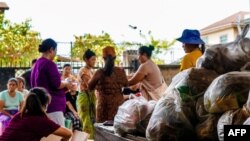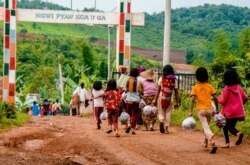The World Food Program is appealing for $86 million to provide help over the next six months to two million people in Myanmar facing acute hunger and the ravages of COVID-19.
U.N. officials say the people of Myanmar are facing poverty, acute hunger and an economic crisis made worse by political instability and repression following the February 1 military coup.
Additionally, COVID-19 is spreading widely and ravaging the country. The World Health Organization confirms nearly 320,000 cases, including 11,000 deaths. Unofficial reports said those figures are greatly underestimated.
World Food Program’s country director in Myanmar, Stephen Anderson, speaking via a video link from the country’s capital, Naypyidaw, said a second wave of COVID-19 last year had a devastating impact on peoples’ livelihoods.
“And now, the third wave is practically like a tsunami that has hit this country," Anderson said. "It is hitting all aspects and creating major havoc in terms of peoples’ health, but we know also it will have a very, very severe impact on peoples’ livelihoods.”
In April, WFP estimated 3.4 million more people could be short of food between May and October. In response, the U.N. agency is scaling up assistance to reach some two million people in the country’s poorest townships. It also is stepping up operations for people newly displaced by clashes and insecurity in recent months.
Anderson said the WFP is distributing food to people in conflict-affected areas in Rakhine, Kachin, and Shan states. In Rakhine state, he noted thousands of Rohingya depend on international aid for survival.
Nearly one million Rohingyas fled to Cox’s Bazar in Bangladesh in August 2017 to escape violence and persecution in Myanmar. Some 600,000 remained behind in northern Rakhine state.
Anderson said the WFP provides monthly rations for 240,000 Rohingya who have been living in camps since 2012. His agency, he said, also is assisting thousands of others living in villages, who are short of food.
He noted people have difficulty surviving by farming because of government restrictions that limit their access to markets to sell their goods.
“We have been providing food assistance," Anderson said. "We also have been trying to support activities such as school meal programs and community development type projects which help people get back on their feet. So, we are doing everything we can to try to support these people.”
Anderson said the people of Myanmar are facing their most difficult moment in living memory. He said people are struggling to put food on the table amid job losses, rising food and fuel prices, political unrest, violence, and displacement.
He said it is critically important that the WFP receives the funding it requires to help those in need.





